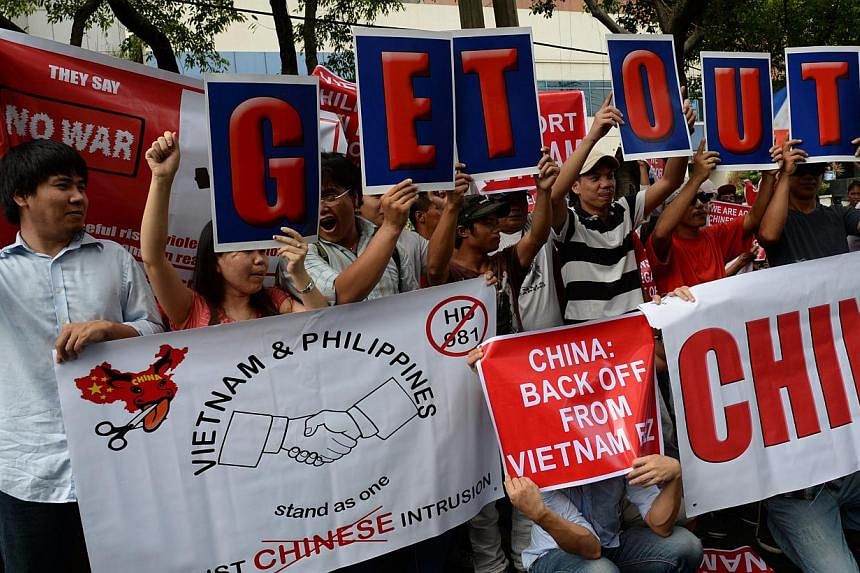THE biggest presence in the council halls of the World Economic Forum's East Asia Summit had not even sent a representative to Manila. Yet none could miss it.
Manila's hosting of WEF was meant to showcase its turnaround story and to tell the world, as President Benigno Aquino did this week, that the Philippines no longer was the "sick man of Asia".
But the backroom chatter, and even a lot of the public conversation, was about the elephant not in the room - China.
Not too long ago, the region had become more at ease with China's rise. Indeed, Beijing had gained much goodwill during the Asian financial crisis in 1997 to 1998, when it held back from competitive devaluation of its currency, giving Asean's economies room to recover. Chinese money has subsequently built much useful infrastructure in the region.
Yet, today, the old worries are back. If the conversations here are a guide, Beijing has a significant public relations challenge on its hands.
"How China views the sanctity of its own borders differs from how it perceives the sovereignty of other people's borders," Singapore-based scholar Parag Khanna of the New America Foundation told a panel on Asian security, summing up the views of many.
In some ways, the Philippines, a minnow when it comes to the regional military pecking order, may seem the appropriate place to discuss China's rising assertiveness in Asia.
Having taken its maritime dispute with its giant neighbour to international arbitration, it has put on the garb of a David taking on Goliath.
Indeed, Manila has been especially artful in its approach, pitching its legal move as "an attempt to gain clarity and a definition of what we can claim as ours", as Ms Laura del Rosario, a senior foreign office figure, puts it.

So it was probably not surprising Vietnam's Premier Nguyen Tan Dung, embroiled in his own dispute with China over the Paracels, had much to discuss with Mr Aquino. The Philippines' leader, after all, recently gave the United States access to his military bases under the Enhanced Defence Cooperation Agreement, a move seen as a deterrent to China.
Indeed, Mr Dung made full use of the occasion to send a variety of signals, stopping just short of saying he was himself taking China to the United Nations. But the message was clear - if you do not talk to me, I have other choices.
The worry about the "other choices" is that nations, willy-nilly, will be dragged into choosing camps, something that militates against the open architecture that Asean has consciously built up over the years.
Some, like Asia expert Ruediger Frank, think it could give rise to version 2.0 of the Cold War, with Asia as the theatre this time. Worse, it could imperil regional economic integration at a time when the world is eyeing the promise of an Asean Economic Community, with a combined gross domestic product exceeding US$2 trillion (S$2.5 trillion).
The outpouring of anger in Vietnam against China, which led to the deaths of at least four Chinese nationals in Vietnamese industrial parks, will surely set transnational companies into recalculating their supply chains and distribution networks. After all, the glue underpinning the grid is a shared peace.
There are other side effects. Russia, for instance, is pursuing its own "Asia pivot", exploiting the opportunities opening up in the region as this week's energy deal with China indicates.
Did it have to be this way?
Maybe it would help if China could be a bit more forthcoming on agreeing to the Code of Conduct to manage regional maritime disputes so desperately sought by Asean. By not doing so, it has raised suspicions of its intention, and kindled fears that it wants to change the status quo on the ground to its advantage, before negotiating.
"Are we changing the environment so that when we are ready to discuss the Code of Conduct, the environment has changed?" asks Ms del Rosario.
There is, of course, the reverse view - that China is only reacting to a sense of being encircled by the US. Not only has Washington talked of a "rebalance" to Asia, it has also added military heavyweight India to its list of strategic partners in recent years. Is there more to the move than a long-delayed concord between the world's biggest democracies?
The US, of course, insists it is not out to contain China. "The only force that can contain China is China itself," says Admiral Samuel Locklear III, the US Pacific Commander. "And that depends on how it behaves in its neighbourhood."
But the US makes no secret of the fact that it will build on its existing patchwork quilt of alliances and near-alliances across the region. And that includes even Vietnam, the only nation that it could not defeat in war.
Far from easing, it appears, regional insecurities are poised only to grow.

